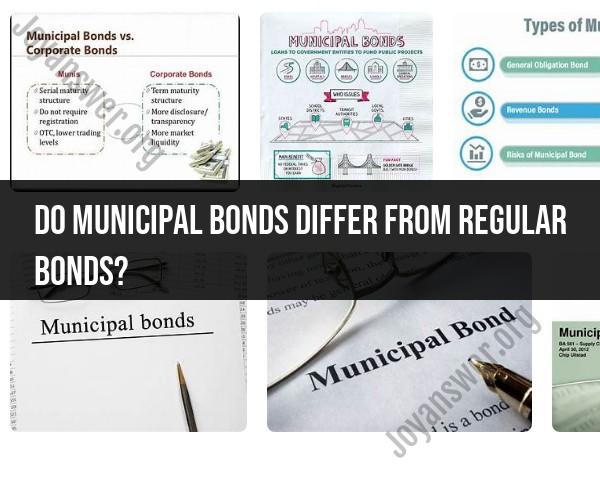Do municipal bonds differ from regular bonds?
Yes, municipal bonds and regular bonds (often referred to as corporate bonds) differ in several key aspects. Here are some of the main differences between municipal bonds and regular bonds:
Issuer:
- Municipal Bonds: Issued by state or local governments, municipalities, or related agencies (e.g., cities, counties, school districts).
- Regular Bonds (Corporate Bonds): Issued by private corporations to raise capital.
Purpose of Issuance:
- Municipal Bonds: Typically issued to finance public projects and infrastructure, such as schools, highways, or water treatment facilities.
- Regular Bonds: Issued by corporations to raise capital for business operations, expansion, or other corporate needs.
Interest Income:
- Municipal Bonds: Interest income is often exempt from federal income tax and, in some cases, state and local taxes. This tax advantage makes them attractive to certain investors in higher tax brackets.
- Regular Bonds: Interest income is generally subject to federal, state, and local income taxes.
Risk Profile:
- Municipal Bonds: Considered lower risk compared to regular bonds issued by corporations. Municipalities have the ability to generate revenue through taxes, and the repayment is often backed by the issuing government's taxing power.
- Regular Bonds: The risk profile can vary widely depending on the financial health and creditworthiness of the issuing corporation. Corporate bonds are generally considered to have higher default risk compared to municipal bonds.
Credit Ratings:
- Municipal Bonds: Rated by credit rating agencies based on the financial stability of the issuing municipality. Higher-rated bonds are considered lower risk.
- Regular Bonds: Also rated by credit rating agencies. The ratings reflect the issuing corporation's ability to meet its debt obligations.
Market Liquidity:
- Municipal Bonds: May have lower liquidity in the secondary market compared to regular bonds. Trading volumes can vary depending on the specific bond.
- Regular Bonds: Generally more liquid in the secondary market, with higher trading volumes.
Use of Proceeds:
- Municipal Bonds: Proceeds are used for public purposes, such as building schools, roads, or other infrastructure projects.
- Regular Bonds: Proceeds can be used for a variety of corporate purposes, including capital expenditures, debt refinancing, or working capital.
Investors should carefully consider their investment goals, risk tolerance, and tax implications when choosing between municipal bonds and regular bonds. Additionally, consulting with a financial advisor is recommended for personalized investment advice.
Bond distinctions: Do municipal bonds differ from regular bonds?
Yes, municipal bonds differ from regular bonds in a few key ways. Municipal bonds, also known as muni bonds, are debt securities issued by state and local governments to fund public projects, such as infrastructure development, schools, and hospitals. Regular bonds, also known as corporate bonds, are issued by corporations to raise capital for various purposes, such as expansion, acquisitions, and debt refinancing.
Exploring the key differences between municipal bonds and other types of bonds
Here are some of the key differences between municipal bonds and other types of bonds:
Taxability: Municipal bonds are generally exempt from federal income tax and may also be exempt from state and local income taxes for residents of the issuing state or municipality. This tax-exempt status can make municipal bonds an attractive investment for investors in higher tax brackets.
Risk: Municipal bonds are generally considered to be less risky than corporate bonds. This is because municipal governments are less likely to default on their debt than corporations. However, there is still some risk involved in investing in municipal bonds, as some municipalities have experienced financial difficulties in the past.
Liquidity: Municipal bonds can be slightly less liquid than corporate bonds. This means that it may be more difficult to buy or sell municipal bonds quickly without significantly affecting the price.
Yield: Municipal bonds typically offer lower yields than corporate bonds. This is because the tax-exempt status of municipal bonds makes them more attractive to investors, which in turn reduces the demand for them and lowers their yields.
Tips for investors in understanding the unique features of municipal bonds
Here are some tips for investors in understanding the unique features of municipal bonds:
Consider your tax bracket: If you are in a higher tax bracket, the tax-exempt status of municipal bonds can make them an attractive investment. However, if you are in a lower tax bracket, you may be better off investing in corporate bonds or other types of taxable investments.
Understand the creditworthiness of the issuing municipality: The creditworthiness of the issuing municipality is a key factor in determining the risk of investing in municipal bonds. Research the municipality's financial history and credit rating before investing.
Consider the type of municipal bond: There are different types of municipal bonds, each with its own unique features. Some common types of municipal bonds include general obligation bonds, revenue bonds, and special assessment bonds.
Seek professional advice: If you are considering investing in municipal bonds, it is a good idea to speak with a financial advisor. A financial advisor can help you understand the risks and potential rewards of investing in municipal bonds and can recommend specific bonds that may be a good fit for your investment goals and risk tolerance.












